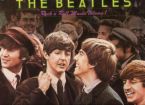 All We Are Saying....Is Give Peace A Chance
All We Are Saying....Is Give Peace A Chance On 93.7 The Arrow this morning, they were talking about the performance posted below, of Paul McCartney performing "A Day In the Life" Live in Liverpool. The remarkable thing about this, the DJs pointed out, is that it was the first time Paul has sang a (primarily) John Lennon song live in concert, and with Yoko Ono in the audience nonetheless. For those familiar with the late years of the Beatles, you might understand how time must have healed some wounds.
Hearing this over the radio, I was overcome with emotional connection to the music, and several thoughts struck me. The first was that Paul's voice has changed with age, and m aybe not for the better (which in no way takes away from his musicial genius), and that Paul does not do a good John. Their voices were actually so different from each other, and the beginning of this song loses some of the effect without John's nasally influence. I was a huge Beatles fan in my younger days (and of course still love their music), but it was always John for me. Maybe I wasn't a Beatles fan as much as I was a John Lennon fan.
aybe not for the better (which in no way takes away from his musicial genius), and that Paul does not do a good John. Their voices were actually so different from each other, and the beginning of this song loses some of the effect without John's nasally influence. I was a huge Beatles fan in my younger days (and of course still love their music), but it was always John for me. Maybe I wasn't a Beatles fan as much as I was a John Lennon fan.
 aybe not for the better (which in no way takes away from his musicial genius), and that Paul does not do a good John. Their voices were actually so different from each other, and the beginning of this song loses some of the effect without John's nasally influence. I was a huge Beatles fan in my younger days (and of course still love their music), but it was always John for me. Maybe I wasn't a Beatles fan as much as I was a John Lennon fan.
aybe not for the better (which in no way takes away from his musicial genius), and that Paul does not do a good John. Their voices were actually so different from each other, and the beginning of this song loses some of the effect without John's nasally influence. I was a huge Beatles fan in my younger days (and of course still love their music), but it was always John for me. Maybe I wasn't a Beatles fan as much as I was a John Lennon fan.Anyway, to me this song seems to be about futility of life and the smallness of our individual existence. The first part, about the lucky man who blew his mind out in a car, reminds me of this movie we watched in college, Faces of Death, and a scene where a man in court pulls out a gun and blows his brains out while the court stenographer cannot help herself from laughing.
Although the news was rather sad...well, I just had to laugh.
Sometimes life is like that. Sometimes we have to laugh to keep from crying. Sometimes laughing is our first and most absurd reaction. Sometimes laughing helps us from taking it all too seriously. If we really think about it, really take in all of what life has to offer, it might be so overwhelming black and sad and futile that we would want to give up. If we reflect on the insignificance of the individual existence, it can make our lives feel meaningless. Oh sure there is the thought of what lies beneath, or above, where our souls go, that provides meaning to a meaningless world, but I am talking about the physical life on earth, and what we leave behind.
In the long run, do the things we belief and act on even matter? What parts of us will become a piece of our lasting legacy, or is legacy a dead issue anyway except as it relates to extreme talent or genetic success? In a hundred years, will our lives have made any kind of lasting impressions, will our names be remembered? Will our life have been meaningful beyond ourselves? Most of us will never know the answers to these questions.
So we take it one day at a time. We apply meaning to our actions on earth.
We wake up, get out of bed, drag a comb across our head....
I always wonder if they meant that we turn to our visceral experience or the metaphysical when we then says I'd love to turn you on.....
 But then suddenly in this version, Paul drifts into another John Lennon song, "Give Peace a Chance". At first I found it unsettling, the tired refrain of an old anti-war hym. Haven't we all gotten past that? It was a remnant from the past, it was a long-haired John Lennon in hotel room love-ins with Yoko, it was a protest of a war that we have all put aside for now. Then I realized that of course this song is still relevant today. Different decade, different war, same message.
But then suddenly in this version, Paul drifts into another John Lennon song, "Give Peace a Chance". At first I found it unsettling, the tired refrain of an old anti-war hym. Haven't we all gotten past that? It was a remnant from the past, it was a long-haired John Lennon in hotel room love-ins with Yoko, it was a protest of a war that we have all put aside for now. Then I realized that of course this song is still relevant today. Different decade, different war, same message.All We Are Saying....Is Give Peace a Chance.
That message might never go out of style.
It reminded me, though, of human evolution, both personal and political.
 I saw images of the Beatles in the early pop years contrasting with the long haired freaky people look of the Maharashi years, juxtaposed Help! with the White Album. Imagine the screaming fans in black and white stadiums across the country, and then the studio years, all long hair and psychedelics. I thought about the bitter split between Paul and John, and the legal battles, and then now, a sixty five year old McCartney onstage doing a tribute to Lennon.
I saw images of the Beatles in the early pop years contrasting with the long haired freaky people look of the Maharashi years, juxtaposed Help! with the White Album. Imagine the screaming fans in black and white stadiums across the country, and then the studio years, all long hair and psychedelics. I thought about the bitter split between Paul and John, and the legal battles, and then now, a sixty five year old McCartney onstage doing a tribute to Lennon. In listening to the song, I was taken back to another era in my life. I was thinking about how it might seem very odd to someone who knew my pothead political ideology back in the day (you say you want a revolution well you know) that I ended up marrying a soldier. I was the neohippie, with boots on, waiting a chance to spring into action on the peace scale ladder. There was beaded necklaces made by hand, bell bottoms, hippiespeak, and a ten year plan for promoting world peace (we all want to change the world). I remember wearing the shirt of John Lennon wearing the "New York" shirt, how I would listen to the Beatles all the time, how fly that shit was on hallucinogens, how I would never compromise my personal beliefs.
My friends who knew me back in the day would sometimes wonder how someone like me could support the war, and I would quip that "I don't support the war, the war supports me", or, "I don't support the war, I support my soldier". All my anti-war beliefs didn't stand in the way of care packages or moral support for our own war hero.
You tell me that it's evolution, well you know...
Sometimes we move along in our personal evolution so far that it becomes hard to recognize ourselves. I look back at that person I was and she seems like someone else, like viewing a movie of someone else's life. I will fervently deny that people change, and I think there is some part of the essence of one's self that will always remain true. The problem is discovering that essence. What are the fixed parts of our psyche that remain unchanged by evolution?
I remember a conversation in recent years with the father of my high school sweetheart. I was telling him about my church and he was surprised, and commented "You never struck me as the type for organized religion." I wondered when he said that how well he had known me at all, because during the time I was dating his son, I was becoming a confirmed Catholic. There were nonpracticing years in there, and now I am a Methodist. Does that make me a different person? I don't think so, I simply see it as someone capable of deep spirituality seeking the right fit.
Does it make Paul a different person to be doing a tribute to his dead friend, when he wouldn't even show up to the Beatles induction into the Rock and Roll Hall of Fame in 1988, citing unresolved difficulties with the remaining members of the band almost two decades after they broke up? Is it change, or is it evolution?
Or is he simply giving peace a chance?



























1 comment:
Great blog.
PEACE!
Post a Comment